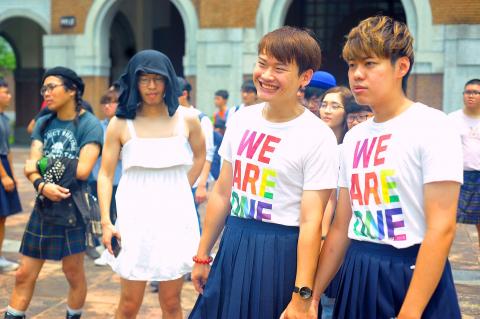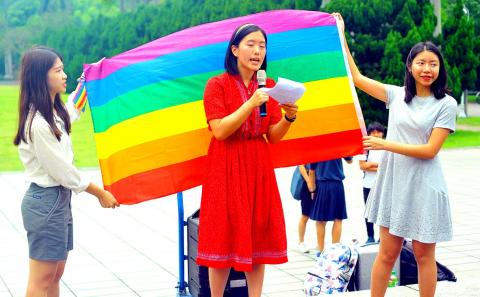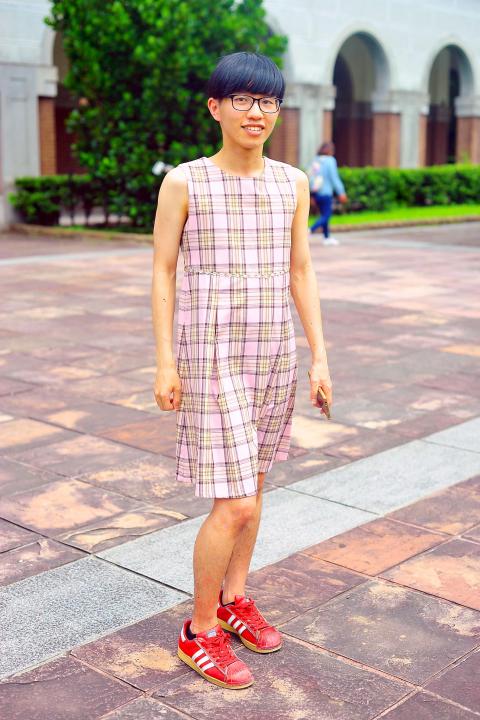Pan Kuan’s (潘寬) mother almost had a breakdown when he asked to borrow a dress to wear to school.
“She’s quite conservative and was worried what people would think,” the National Taiwan University student says. “But after I explained the reason behind it, she started giving me advice on how to dress up. She even insisted that I wear this pink dress because she thinks it looks nicer.”
Pan was among roughly 50 men who put on a skirt or dress yesterday in front of the NTU main library in support of NTU manskirt day. Partially held in response to the commotion caused last week by Banqiao Senior High School’s “manskirt week,” yesterday’s event was put on by members of NTU’s NTU Political Science Student Association (政治系學會學術部) who have participated in a semester-long reading group focusing on gender issues. Skirts were provided on site for male students to borrow, while females were encouraged to flaunt what they usually wouldn’t wear.

Photo: Han Cheung, Taipei Times
Event coorganizer Lin Hui-chu (林蕙竹), a Banqiao Senior High School alumnus, delivered the main speech, calling for the breakdown of gender stereotypes and acceptance of people with different gender identities. Beginning with Yeh Yung-chih (葉永鋕), who died at the age of 15 after being constantly bullied due to his alleged “effeminate” behavior bullying, Lin detailed up to modern day the tragedies that have taken place due to society not accepting people who don’t fit into society’s gender standards.
“Who has tried to help the students who struggle with their gender identity?” she asked. “How many people know the struggle and pain one feels when they discover that they’re different?”
SKIRTS ON MEN WORLDWIDE

Photo: Han Cheung, Taipei Times
New Taipei City councilman Lin Kuo-chun (林國春) was among the most vocal critics of Banqiao Senior High School’s event, questioning the school’s principal Lai Chun-chin (賴春錦), and saying that he was doing so on the behest of concerned parents who may not want their child to attend the school anymore.
Even President Tsai Ing-wen (蔡英文) felt compelled to respond to the backlash, voicing her support for the students on Saturday and asking society to be more tolerant.
Lin Kuo-chun reiterated his anti same-sex marriage stance on Facebook, stating that he is not against male students wearing skirts but believes that the parents should be notified beforehand and that there should have been more prior discussion regarding the appropriateness of such behavior.

Photo: Han Cheung, Taipei Times
“To discuss whether it’s appropriate for male students to wear skirts is equating the issue to improper textbook materials or drug use … We should not back down from unreasonable beliefs masked behind false morals and ethics,” Lin Hui-chu said at NTU yesterday.
Of course the West isn’t free of gender stereotyping, but men wearing skirts may be gaining traction. GQ published a piece in February, “2019 is the Year Men Will Start Wearing Skirts,” where it wrote that the practice is becoming increasingly common in the fashion industry. “There’s no shock value. It’s just another garment,” Rachel Tashjian writes in the report.
Japanese student Konfu So, who donned a skirt at the event, says that even though Japan is also relatively conservative, people wouldn’t react so strongly to male students wearing skirts due to the examples set by the fashion-forward youth who are fixtures of Tokyo’s trendy areas such as Harajuku. Last year, many schools in Japan started introducing genderless uniforms to support its LGBTQ students.
“It feels like in Taiwan, younger people are under more pressure from the expectations of the older generation,” So says.
However, men wearing skirts isn’t anything new to Taiwanese university campuses either. NTU students promoted a “manskirt month” in 2014 with smaller related events occurring in subsequent years, and National Cheng Kung University also made the press for hosting their version in December 2015. But schools like NTU have long been known for its liberal and open-minded atmosphere, spawning many social movements over the decades. Lin Hui-chu still expected some negativity about yesterday’s event, but she is pleasantly surprised that almost all the response has been supportive.
When the same thing happens at a high school, the backlash is apparent; but on the positive side it seems that the school’s principal and the teachers have openly stood behind the students in support of their ideals.
IN OTHERS’ SHOES
While the students had the option of removing and returning the skirts after the event, Lin Hui-chu hopes that they keep it on for at least the rest of the day.
“Only by walking around in a skirt will they experience how unfriendly society can be toward people who are different,” she says.
Chiu Chun-fang (邱群方) and Huang Chun-hua (黃俊華) both wore skirts for the first time.
“It seems that once I put it on, I inadvertently started paying attention to how people looked at me,” Chiu says.
“This kind of thinking is already ingrained in our brains,” Huang says. “We feel such pressure even wearing a skirt for one day for a specific event. But this is how men who want to wear skirts feel for their entire lives.”
Pan plans on wearing the dress for the rest of the day, including his scooter ride home. His only concern is whether his skirt will fly up during the ride.
“It’s so comfortable,” he says. “I’ve never felt so breezy before, even in shorts. I’m getting more and more used to it. I think for the rest of the day I should behave as naturally as possible so that our message can have more impact.”

On April 26, The Lancet published a letter from two doctors at Taichung-based China Medical University Hospital (CMUH) warning that “Taiwan’s Health Care System is on the Brink of Collapse.” The authors said that “Years of policy inaction and mismanagement of resources have led to the National Health Insurance system operating under unsustainable conditions.” The pushback was immediate. Errors in the paper were quickly identified and publicized, to discredit the authors (the hospital apologized). CNA reported that CMUH said the letter described Taiwan in 2021 as having 62 nurses per 10,000 people, when the correct number was 78 nurses per 10,000

As Donald Trump’s executive order in March led to the shuttering of Voice of America (VOA) — the global broadcaster whose roots date back to the fight against Nazi propaganda — he quickly attracted support from figures not used to aligning themselves with any US administration. Trump had ordered the US Agency for Global Media, the federal agency that funds VOA and other groups promoting independent journalism overseas, to be “eliminated to the maximum extent consistent with applicable law.” The decision suddenly halted programming in 49 languages to more than 425 million people. In Moscow, Margarita Simonyan, the hardline editor-in-chief of the

Six weeks before I embarked on a research mission in Kyoto, I was sitting alone at a bar counter in Melbourne. Next to me, a woman was bragging loudly to a friend: She, too, was heading to Kyoto, I quickly discerned. Except her trip was in four months. And she’d just pulled an all-nighter booking restaurant reservations. As I snooped on the conversation, I broke out in a sweat, panicking because I’d yet to secure a single table. Then I remembered: Eating well in Japan is absolutely not something to lose sleep over. It’s true that the best-known institutions book up faster

Though the total area of Penghu isn’t that large, exploring all of it — including its numerous outlying islands — could easily take a couple of weeks. The most remote township accessible by road from Magong City (馬公市) is Siyu (西嶼鄉), and this place alone deserves at least two days to fully appreciate. Whether it’s beaches, architecture, museums, snacks, sunrises or sunsets that attract you, Siyu has something for everyone. Though only 5km from Magong by sea, no ferry service currently exists and it must be reached by a long circuitous route around the main island of Penghu, with the